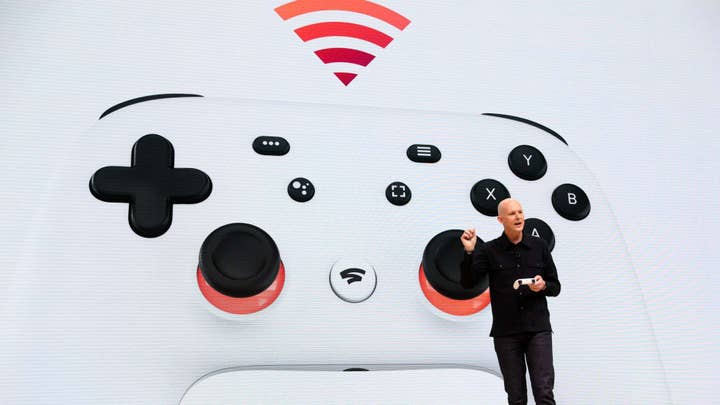Google's shutdowns relegate streaming to "gaming of the gaps" | Opinion
If cloud streaming is just a new distribution option, not an enabler of revolutionary new games, it will never fulfill its promise
Google's ambitions of being a major game publisher are over almost before they even started. The technology giant is shutting down the studios it established in Montreal and Los Angeles to create Stadia exclusive games, affecting around 150 staff, while EA and Ubisoft veteran Jade Raymond, who had been hired to lead those efforts, is leaving the company.
It's easy, and indeed tempting, to pour scorn on Google for this whole debacle, not least since it's impacted the careers of so many development staff. But the overriding sentiment in most commentary I've read or heard about this is: "well, duh." Of course Google did this. Google was always going to do this. It was only ever a question of when, not if.
That's a hard sentiment to disagree with. Google's track record of abandoning products and services that don't immediately succeed is legendary, after all -- but the legend isn't entirely correct in its framing. Google may sometimes look like a kid on a Christmas morning sugar rush, bouncing constantly to new toys, leaving the ones it was excited about only minutes ago forgotten under the sofa, but it is also perfectly capable of knuckling down and focusing on building long-term value. It just doesn't know how to do that -- or doesn't care to do that -- in any business that involves selling things to consumers.
The overriding sentiment in most commentary I've read or heard about this is: "well, duh." Of course Google did this
Stripped down to its core, Google is essentially a pure B2B enterprise -- it's just one that occasionally confuses its actual core business (selling access to consumers to other companies) with a B2C one (selling things to consumers), which leads to dalliances with products or services that are half-heartedly marketed to ordinary folk before being abandoned down the line.
The core of what's just happened to Stadia is that Google had another daydream about being a B2C enterprise, imagining itself as not only a service provider for consumers, but even a content creator. Ultimately, reality has reasserted itself, and the company has pivoted back to familiar territory. It won't make original games; I suspect that sooner rather than later, it won't have a Google-branded consumer-facing game streaming service at all, in fact. The logical endpoint of Stadia's transition is becoming a B2B product, a kind of white-label game streaming service that publishers can use to power their own game streaming products.
In my colleague Christopher Dring's column on the closure of the Stadia studios this week, he suggested that this pivot away from the idea of exclusive software on streaming platforms makes a great deal of sense. In fact, that Google's commitment to exclusive Stadia titles wasn't just too little, too late for the service, but that it undermined the actual role a streaming service could realistically play in the market today -- namely filling in gaps in the console gaming experience and reaching out to demographics who aren't interested in buying expensive gaming hardware. It's a realistic and grounded assessment, but I think it undersells just how much the entire promise of cloud gaming has been diminished, almost to the point of irrelevance, by the downsizing of Google's ambitions.
The logical endpoint of Stadia's transition is becoming a kind of white-label game streaming service that publishers can use
As Christopher rightly points out, the realistic usage cases for cloud streaming right now are pretty narrow. It can do some handy things like letting you play your Xbox games on your phone or tablet when you're away from home, or letting someone without especially powerful PC or console hardware play the latest games. Ironically, Stadia's studio closures come just weeks after the service earned its first really positive news cycle by being a solid option for playing the chronically demanding Cyberpunk 2077 on older hardware.
The limitations even on those narrow use cases are, however, pretty severe. The demands in terms of network connection quality are intense, and even for users whose networks can support that kind of usage, bandwidth costs or caps can pose a huge problem, especially on mobile devices (one of the most appealing usage cases). Issues with input lag and image fidelity persist. Ultimately, you'll never choose to play a cloud streaming version of a game if you have access to the hardware required to run the local version; the use cases for cloud streaming are effectively "gaming of the gaps", grouting in the cracks where consumers can't, for whatever reason, access a decent gaming device.

Bandwidth issues will improve over time, of course, but the challenge cloud streaming has always faced -- right since its earliest days -- is that the costs and performance of broadband and mobile networks tend to be slower to improve than the costs and performance of consumer electronics devices. There are a host of reasons for that, but the reality remains that literally billions of consumers are engaged in a constant upgrade cycle to increasingly high-performance computing devices -- phones, tablets, laptops, even cheap TV streaming sticks are increasingly gaming-capable -- while the infrastructure rollout for higher performance broadband is, for many consumers, glacially slow. Many advocates of game streaming view 5G as something of a holy grail, but what kind of gaming performance will our everyday devices have when the day finally rolls around that we can all use 5G networks for streaming?
This problem seems destined to relegate streaming to its "gaming of the gaps" role not just temporarily, but forever. Unless there's some dramatic change to either hardware upgrade cycles or broadband networks or both, it's hard to imagine reaching a point any time in the foreseeable future where the thin client model for gaming is more appealing to consumers than just playing a game on the blazingly fast silicon under your TV, in your pocket, or on your desk.
The loss of even the potential for streaming-exclusive titles is a blow to anyone who believes it is the future of the medium
Unless, of course, there's something you can do on a game streaming title that you can't do elsewhere. Something enabled by the massive underlying shift in architecture that sees a game go from being a standalone piece of software on each user's device -- perhaps talking over a network, but intrinsically confined to a single device -- to being, in theory, a gargantuan piece of software running in the cloud, with each user simply viewing one facet of that software over a video stream.
For all that I've been a game streaming naysayer for years, this aspect of the future vision has always been genuinely exciting. The idea that game streaming isn't just a shift in distribution, like the move from physical retail to digital downloads, but a huge architectural and conceptual shift for the games themselves. Here was a real possibility to make streaming into something more than a filler when nothing better was available; to overcome the technical limitations of streaming simply by compensating for them with brand new experiences that couldn't be achieved in any other way.
Google's backing off from Stadia exclusives, as inevitable as it may have been, sounds like nails being firmly hammered into the coffin of that idea. Google was the firm most clearly motivated to pursue the avenue of streaming exclusives and the exploration of what new kinds of game might be rendered possible by cloud technologies. The other companies who are driving cloud gaming services, like Microsoft and Sony, don't have any obvious interest in developing games that run only on the cloud -- they're more than happy for their consoles to be the premier place to play, while their cloud services fill in the gaps and broaden the demographic.
Amazon, perhaps, might be interested in stepping up. However, its long-term commitment to being a games company doesn't feel much more stable than Google's -- though at least Amazon has plenty of form as a real B2C company and content creator -- and it doesn't as yet seem to have any designs on a consumer-facing game streaming offering.
We may never know what visions of the future were being pursued in Google's shuttered studios; who knows, perhaps the problem was actually that the visions were too pedestrian, the architectural shift failing to yield new game ideas that were actually compelling enough to be worthwhile. Nonetheless, the loss of even the potential for streaming-exclusive titles is a blow to anyone who believes that streaming represents the future of the medium.
Without it, the whole proposition of game streaming may be more realistic, but it's also terribly stunted. Until someone else steps up to put budget and commitment behind exploring the potential for exclusives, streaming is always going to be little more than a snack between consoles.

